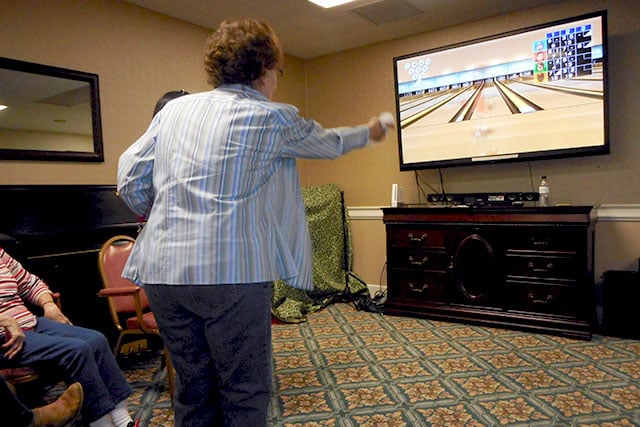
When you think of a "gamer," you probably don't think of a 65-year-old woman spending her afternoon on a gaming console. But think again—an estimated 29% of people who play video games are over the age of 50. What’s more, it turns out that some of those older "gamers" are reaping very significant health benefits as a result.
Here are some of the social, cognitive and physical benefits that video games, virtual reality (VR), and innovative sensory technologies offer to seniors.
Better Emotional Well-being
Whether it's going for a walk, meeting friends for lunch, or seeing a movie, doing anything you enjoy improves emotional health. So it's no surprise many seniors who enjoy playing video games find themselves in better moods.
A study from Osaka University found that playing video games actually helps improve mental well-being. The research showed that gaming reduces stress and increases life satisfaction. For seniors, video games provide enjoyable challenges and social connections that can lift spirits and create a sense of community.
Improved Balance
Video games can provide physical benefits, too, especially to seniors. Certain games that require physical interaction, like the VR game Beat Saber, Nintendo Switch Sports and other motion-controlled titles, can help seniors improve balance, coordination, and reflexes due to the quick decision-making and action required to play. Some seniors have even reported faster walking speeds as a result of playing video games.
It may not be obvious at first, but improving cognitive skills can translate into improved balance and gait. And while fitness video games on the newer Nintendo Switch have revolutionized exercise for seniors, VR is already leaving its mark on physical therapy. New programs as simple as walking through a landscape projected on a TV screen have shown some remarkable results.
Research shows that VR treadmill training improves balance and reduces falls in elderly participants. In clinical trials, seniors who engaged in structured virtual reality exercises showed substantial improvements in balance scores and experienced fewer falls compared to control groups. This combination of physical and cognitive training creates a more effective rehabilitation experience that targets both body and brain function.
ENHANCED COGNITIVE ABILITY
Video games have the potential to support improvement not only emotionally and physically, but cognitively, as well.
A study published by the National Institute on Aging found that video games can significantly improve memory function in older adults experiencing age-related cognitive decline. The research showed that video games provide novel environments that stimulate the hippocampus, the brain region critical for memory. For seniors who may be homebound, these virtual environments offer an engaging way to keep their brains active and healthy.
Playing video games exercises a gamer’s memory, especially short-term memory. Playing even occasionally can help seniors remember things like names, addresses, phone numbers, dates and times better than they do without video game stimulation. They also force players to switch quickly between different tasks, which can lead to increased mental flexibility and multi-tasking ability for seniors.
Furthermore, VR technologies have been used in cognitive and physical assessments and therapeutic interventions for individuals with dementia. These technologies have been shown to improve mobility, prevent falls and increase cognitive abilities in those with dementia and those who are at risk of developing dementia.
Popular brain training apps like Lumosity, CogniFit and Elevate offer scientifically designed games that target memory, attention and problem-solving skills in formats that are accessible to seniors.
Reduced Risk of Alzheimer’s
With an estimated 7.2 million seniors living with Alzheimer's in the U.S. alone, treatment methods are heavily studied and highly valued. This condition is one of the leading causes of death in the United States, with mortality rates increasing by 145% since 2000, while other leading causes of death have declined.
A large-scale study provides powerful evidence of gaming's protective effects. Researchers followed over 471,000 participants and discovered that playing computer games regularly was linked to decreased dementia risk, improved cognitive functions and better brain structure. Scientists were able to demonstrate a potential causal relationship between gaming and reduced Alzheimer's risk—suggesting that picking up a controller might actually be changing your brain in beneficial ways.
Sensory Innovations: The Power of Interactive Technology
Beyond traditional video games and VR, a new wave of sensory innovations is revolutionizing engagement for seniors, particularly those with dementia and memory care needs. Among those is the Tovertafel (or "Magic Table") from Tover.
The Tovertafel projects interactive light games onto any table surface, allowing seniors to interact with colorful objects that respond to hand movements. What makes it special is that it requires no complicated controls—seniors simply reach out and interact naturally with the projections.
At Villa at Terracina Grand, a community managed by The Goodman Group in Naples, FL, residents have experienced moments of joy and connection through these games, which stimulate physical activity, social interaction and cognitive engagement simultaneously. For residents with dementia, the Tovertafel has proven particularly valuable, often prompting responses from those who may otherwise be difficult to reach.
Other innovative sensory technologies emerging include SoundScape audio systems, TouchSense tactile feedback and programmable AromaTherapy Tech, all working to increase engagement, reduce agitation, improve mood and enhance quality of life.
All the Benefits—Plus Lots of Fun
What's fun is how these technologies create common ground between generations. Grandchildren visiting their grandparents often find themselves delighted to share gaming experiences, reversing traditional roles as seniors showcase their gaming skills. The friendly competition and collaborative nature of these games transform routine visits into memorable experiences that both generations look forward to.
Video games and sensory innovations are just one of many stimulating activities that residents enjoy at The Goodman Group’s managed communities across the country. We make it our mission to find new ways to engage and delight residents every day while providing them physical, mental and emotional benefits.

